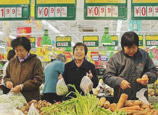
Analysts in the agricultural industry said the price decline was mainly caused by the weak demand and, pressed by rising costs for hog feeds, the industry is likely to see widespread losses.
Ji Guangxin, an analyst with Beijing-based SCI, a major portal for Chinese commodity information, said: "The hog market faces a problem of oversupply as farmers have a large number of hogs on hand, while pork consumption declined by 30 percent to 40 percent from the end of last year."
Grain prices, however, were on the increase, which bid up the feeds prices for the hog industry. The ratio of pork to grain prices surged to 5.6-to-1 by March 15, according to SCI's data. A ratio lower than 6-to-1 means a loss for farmers.
"The ratio has been staying at this level for the past four weeks, which means farmers and companies in the industry are facing losses," Ji added.
Ji also said the situation is expected to persist until the latter half of this year, and it is unlikely to see any substantial recovery in consumption.
"This might lead to further industry consolidation as big companies will take this opportunity to expand their scale," Ji said.
The National Development and Reform Commission, the country's top economic planning agency, recently said that if pork prices continue their downward trajectory, the government will increase national pork reserves in the next month to shore up prices.

















 Incredible inventions by Chinese
Incredible inventions by Chinese


![]()
